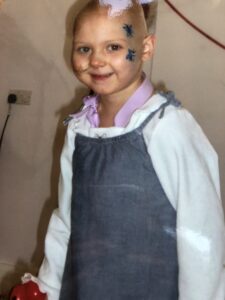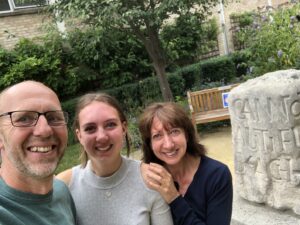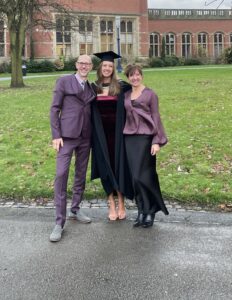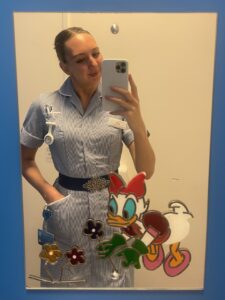
24 Apr 2025
Molly’s Story: Working on the ward that treated her
The gruelling nature of leukaemia treatment can leave traumatic memories with many people. But for Molly Shelley, it’s had quite the opposite effect. Diagnosed at just three years old, Molly is now a young woman beginning her career – and has chosen a path that has been entirely shaped by what she went through.
“I had all the typical symptoms of childhood leukaemia,” said Molly, now 22, who lives in Hertfordshire. “Uncontrollable high temperatures, rashes, extreme fatigue, infections. I also had a distended stomach and refused to walk because my legs hurt.
“Throughout the end of 2005 and early 2006 my parents visited the GP and A&E countless times. I was treated for ear infections and eventually referred to a knee specialist. Fortunately this consultant wouldn’t see us without an appointment to see a paediatrician first. The paediatrician told my parents I needed to go to straight to A&E as they thought I might have leukaemia. The doctors did blood tests and an hour later Mum and Dad were told the chances were high that I did have blood cancer.”
Molly and her parents were sent by ambulance to Addenbrookes Hospital in Cambridge where on 25th May 2006 the diagnosis of acute lymphoblastic leukaemia (ALL) was confirmed.
“Receiving the diagnosis was devastating and our world turned upside down in minutes,” said Molly’s mum Alison. “But it was also a huge ‘relief’ in some way to finally have a diagnosis and urgent care and attention to what we knew was something very wrong with our daughter. However it was frightening. The healthcare professionals were brilliant. It was life changing especially having Molly’s one-year-old sister Daisy to look after as well.”
 Molly’s treatment began immediately with daily chemotherapy in hospital. After six weeks the family was given the news that Molly was in remission but would need two more years of treatment, tests and blood transfusions both at Addenbrookes and also nearer home at the Lister.
Molly’s treatment began immediately with daily chemotherapy in hospital. After six weeks the family was given the news that Molly was in remission but would need two more years of treatment, tests and blood transfusions both at Addenbrookes and also nearer home at the Lister.
“I am incredibly lucky as I really only have positive memories of the hospitals, the nurses and doctors and all my treatment,” said Molly. “I know this is very unusual. I was also lucky to go to a tiny village primary school. When I went back everyone was incredibly supportive. There were only 70 children and I’d just started when I got sick. Everyone knew about my leukaemia and I still have all the cards everyone wrote to me at school. Again I know this is not the same for every child.”
Weekly then monthly checkups turned to yearly for Molly until she was around 16 and fully discharged.
 “I was in sixth form at the time and it was a very emotional day, for Mum and Dad as well. Because again I was lucky with no setbacks, by that time I’d just got used to an annual checkup and didn’t even really think about it. For my parents it was more emotional and that point really was the end of it.”
“I was in sixth form at the time and it was a very emotional day, for Mum and Dad as well. Because again I was lucky with no setbacks, by that time I’d just got used to an annual checkup and didn’t even really think about it. For my parents it was more emotional and that point really was the end of it.”
Many teenagers would have wanted to put the experience behind them completely and never go near a hospital again. But this was not to be Molly’s path.
“I went into 6th form with no idea of what I wanted to do. I did mixed A Levels just in subjects I enjoyed, one of which was psychology. I thought about going to uni but then my best friend mentioned she wanted to do midwifery and that there was going to be an open day at Addenbrookes. I went, and got talking to the nurses there, and suddenly everything slipped into place. I went straight home and that night started googling nursing training.”
 Molly studied at the University of Birmingham for four years and qualified with a Masters degree in paediatrics and mental health nursing. For her first job she knew there was only one hospital and ward she wanted to work on.
Molly studied at the University of Birmingham for four years and qualified with a Masters degree in paediatrics and mental health nursing. For her first job she knew there was only one hospital and ward she wanted to work on.
“It felt crazy when I walked back in to Addenbrookes in my uniform! The Paediatric Day Unit (PDU) was much smaller than I remembered – because of course it seemed really big when I was little child back then. But it wasn’t so much the ward, it was the people. I could see myself in my patients and, even more, my parents in their parents, that’s what’s really special to me.
 “Some of my colleagues know now. And I have told one or two parents, as it came up in conversation and I thought it might help them. I had some lovely feedback from one saying hearing my story had given them a sense of hope and light at the end of the tunnel. Because I had such a good experience in hospital I am very comfortable there and want to help other children feel the same. It is amazing to be able to give back for everything that was done for me and I couldn’t imagine doing anything else.”
“Some of my colleagues know now. And I have told one or two parents, as it came up in conversation and I thought it might help them. I had some lovely feedback from one saying hearing my story had given them a sense of hope and light at the end of the tunnel. Because I had such a good experience in hospital I am very comfortable there and want to help other children feel the same. It is amazing to be able to give back for everything that was done for me and I couldn’t imagine doing anything else.”
Molly ran the Cambridge Half Marathon in 2025 to raise money for Addenbrookes and has now committed to running the 2025 London Marathon for Leukaemia UK and Blood Cancer UK.
“What I went through affected my whole family. My younger sister is currently studying biomedicine, working in hospital labs. Mum has since worked for NHS and currently works for a Genomics company, also based in Cambridge – some of her work being personalized chemotherapy for children using genomics. We all have a drive to give back, and it is going to be fantastic running in honour of two special charities that do so much work to help people like me and my family.”
Molly is fundraising
Molly is running the London Marathon for Leukaemia UK and Blood Cancer UK
Related posts
5 July 2023
UK’s top chefs unite at gastronomic spectacular to raise funds for life-saving leukaemia research
Twenty of the most accomplished and innovative chefs from the UK food scene will gather at The Dorchester on Monday 18th September 2023 for ‘Who’s Cooking Dinner?’, a one-of-a-kind night…
27 August 2020
Leukaemia UK appoints new CEO
The trustees of Leukaemia UK are delighted to announce that they have appointed Fiona Hazell as CEO of Leukaemia UK. Fiona brings a strong track record in not-for-profit leadership, starting her role on 9th September 2020.
11 February 2022
International Childhood Cancer Day: Dr Samanta Mariani reflects on her research into infant leukaemia
On International Childhood Cancer Day, Dr Samanta Mariani reflects on her research into infant leukaemia, what drives her in her work and her hopes for the future.
18 October 2021
Leukaemia UK drives forward progress for leukaemia research through five new John Goldman Fellowships for 2021
Leukaemia UK announces five new John Goldman Fellows for 2021 to accelerate progress and stop the disease devastating lives.